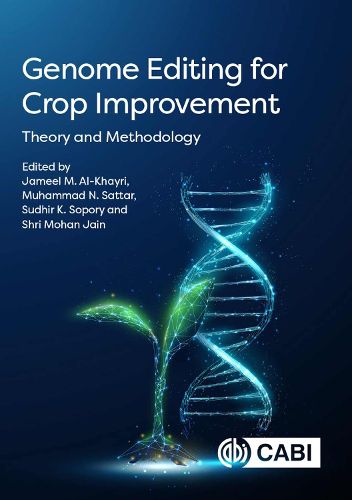Readings Newsletter
Become a Readings Member to make your shopping experience even easier.
Sign in or sign up for free!
You’re not far away from qualifying for FREE standard shipping within Australia
You’ve qualified for FREE standard shipping within Australia
The cart is loading…






Genome editing offers a powerful tool to significantly accelerate crop-breeding programs in order to develop new and improved varieties. It allows precise modification of an organism's DNA sequence, often by creating targeted double-strand breaks at specific locations. The CRISPR-Cas system has emerged as the preferred method of gene editing and offers a powerful technology for crop improvement. The use of CRISPR in plant research has led to significant improvements in crop performance in terms of yield, nutrition, stress tolerance and resistance against agricultural pests and diseases. This book explores the cutting-edge field of genome editing, its applications and potential to revolutionize the genetic improvement of crops. It includes: Foundational concepts and historical context of genome editing (GE). Structure and mechanisms of various genome editing techniques. Application of GE for trait improvements in plants. Regulatory, biosafety, and ethical considerations. This is a valuable resource for researchers in crop genetic improvement, graduate and postgraduate students in molecular biology and biotechnology programs, and professionals in the field.
$9.00 standard shipping within Australia
FREE standard shipping within Australia for orders over $100.00
Express & International shipping calculated at checkout
Genome editing offers a powerful tool to significantly accelerate crop-breeding programs in order to develop new and improved varieties. It allows precise modification of an organism's DNA sequence, often by creating targeted double-strand breaks at specific locations. The CRISPR-Cas system has emerged as the preferred method of gene editing and offers a powerful technology for crop improvement. The use of CRISPR in plant research has led to significant improvements in crop performance in terms of yield, nutrition, stress tolerance and resistance against agricultural pests and diseases. This book explores the cutting-edge field of genome editing, its applications and potential to revolutionize the genetic improvement of crops. It includes: Foundational concepts and historical context of genome editing (GE). Structure and mechanisms of various genome editing techniques. Application of GE for trait improvements in plants. Regulatory, biosafety, and ethical considerations. This is a valuable resource for researchers in crop genetic improvement, graduate and postgraduate students in molecular biology and biotechnology programs, and professionals in the field.